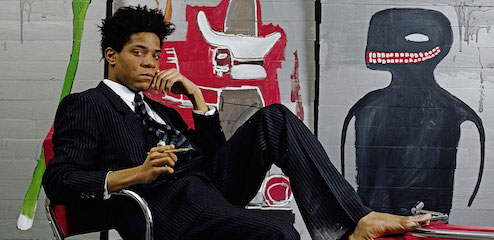
Jean-Michel Basquiat (1960-88, age 27). A groundbreaking American artist who rose from the underground graffiti scene in New York City to become one of the most influential figures in contemporary art — all before his untimely death at age 27.
Basquiat was born in Brooklyn, New York and died of a heroin overdose in Manhattan‘s East Village. His father was Haitian and his mother Puerto Rican; his Afro-Caribbean heritage heavily influenced his art. He was a self-taught artist who spoke multiple languages and had a sharp intellect, often incorporating historical, anatomical, and political references into his work.
Early Career – SAMO
• As a teen, Basquiat gained attention as one half of the graffiti duo SAMO (Same Old Sh*t), tagging cryptic messages around SoHo and the Lower East Side in the late ’70s.
• His poetic and socially charged messages stood out in NYC’s chaotic urban landscape, blending art, protest, and philosophy.
Style & Themes
Known for his raw, expressive lines, bold colors, and incorporation of text, symbols, crowns, skeletons, and African iconography, Basquiat tackled heavy themes like:
o Black history and cultural pride
His work was full of irony and contradiction, often mixing childish scrawls with profound commentary.
Breakthrough & Collaborations
• In the early 1980s, Basquiat caught the attention of the art world’s elite.
• Andy Warhol became both mentor and collaborator — their joint exhibitions were controversial but iconic.
• By 1982, Basquiat was exhibiting internationally and had become the first Black artist to gain major traction in the elite, often white-dominated contemporary art world.
Legacy
• Today, Basquiat‘s work sells for tens of millions. One painting, Untitled (1982), sold for $110.5 million in 2017 — one of the highest ever for an American artist.
• He’s become a cultural icon — influencing fashion, hip hop, and pop culture.
• His art is more relevant than ever in discussions about systemic racism, capitalism, and the commodification of culture.